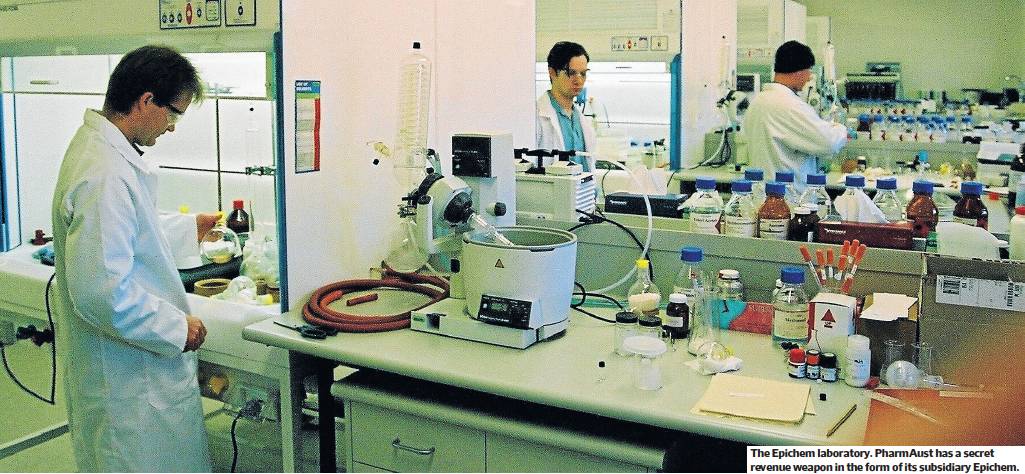Hope on the horizon for chemo alternative
What if you could stop cancer in its tracks, not by killing it but by ‘‘putting it to sleep‘‘?
Clinical-stage oncology company PharmAust, which is listed on the Australian Securities Exchange under the code PAA, is pursuing this possibility with a drug that appears to induce stasis, or dormancy, in cancer cells, and has none of the toxic effects of chemotherapy.
As PharmAust executive chairman Dr Roger Aston puts it: ‘‘We’re looking at a product that might allow you to live with your tumour. It’s not dying, but it’s not replicating either’’.
PharmAust specialises in repurposing drugs that have already been brought to market, an approach that lowers the risks and costs of developing a medication from scratch.
The company’s leading drug candidate is monepantel, or MPL, which is already approved as a medication for gut parasites in animals.
MPL has been shown to modulate the mTOR pathway, an enzyme mechanism that regulates the growth and proliferation of cells.
It appears to cause a starvation-like effect on cancer cells, interfering with cell growth, division and metabolism. Other mTOR inhibitors have already been approved to treat various human diseases, including breast cancer. This market is valued at more than $US2 billion each year.
The mTOR inhibitors are generally known to have low side-effect profiles and can be used in conjunction with more broadly used chemotherapies.
PharmAust has completed Phase 1 clinical trials using MPL in both humans and dogs diagnosed with cancer. Both studies showed safety, reductions in key clinical biomarkers and evidence of efficacy.
PharmAust is planning further trials in both humans and dogs to explore the question of how long the static phase can last.
‘‘We’ve been trying to find a drug that stops the cancer cells dividing without disabling the immune system,’’ Aston says.
‘‘Chemotherapy goes in with all guns blazing and targets all rapidly-dividing cells. So, as well as cancer cells, it affects hair follicles, causing baldness, and the cells of the stomach lining, causing nausea.
‘‘Even worse, it targets the immune system, and that diminishes the body’s ability to fight the cancer. Then the tumour becomes resistant to the chemo, and when it comes back it does so with a vengeance.’’
MPL itself is owned by Elanco, the veterinary products subsidiary of US pharmaceutical giant Eli Lilly, but PharmAust holds multiple ‘‘methods of use’’ patents that give it the rights to the use of MPL as an anti-cancer treatment.
PharmAust also holds registered intellectual property rights on the effects of MPL on neurodegenerative diseases such as Alzheimer’s and Parkinson’s.
Drug development is a notoriously risky and expensive endeavour, but PharmAust has a secret revenue weapon in the form of its subsidiary Epichem, a synthetic and medicinal chemistry company based in Perth that exports products and services to more than 30 countries.
With a staff of 27, and revenues of more than $3 million in each of the last two years, Epichem focuses on drug discovery, custom synthesis and preparation of reference materials to support pharmaceutical manufacturing.
Epichem’s chief executive officer Dr Martine Keenan says: ‘‘Organic chemistry is our core business.
‘‘It’s a competitive global industry, but we believe our edge is that we solve a lot of technical problems for customers and then they stay.
‘‘About 80 per cent of our clients are offshore, but there’s a groundswell of biotech in Australia and, having recently completed a dual expansion of our laboratories, we’re looking forward to collaborating more with the domestic market as well.’’
PharmAust has also entered into an Option Agreement with Elanco to use MPL for treating cancer in dogs, and hopes that the income from the business will underpin its corporate goal of gaining approval for its use also in humans.
The overall global market for veterinary medical products is worth more than $US27 billion a year.
There are an estimated 90 million dogs in the US, where 6 million dogs are diagnosed with cancer every year.
The American Pet Products said in 2015 that almost 80 per cent of all dog owners have their dogs treated with drugs.
As MPL is already registered for use in animals, PharmAust can significantly reduce the cost and time required to register it as a pet treatment for a different condition.
PharmAust plans to use the information gained from this use to inform and de-risk its human clinical development program.
Aston says: ‘‘Repurposing an existing drug is considerably cheaper than developing a new one from scratch.
‘‘Our product is very non-toxic, generally speaking, and it’s very cheap to make so it will be quite an acceptable product on a cost basis.’’
PharmAust has also initiated a preclinical programme to screen its portfolio of proprietary aminoacetonitrile (AAD) compounds for anticancer activity.
These novel compounds are related to but distinct from MPL and have the potential to provide the company with a fully proprietary oncology pipeline.
We’ve been trying to find a drug that stops the cancer cells dividing without disabling the immune system.
Dr Roger Aston
